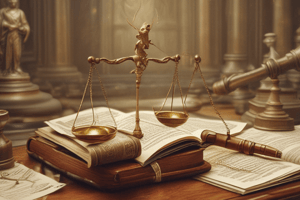Podcast
Questions and Answers
What is the ultimate authority conferred upon the client according to the text?
What is the ultimate authority conferred upon the client according to the text?
- Choosing the lawyer's legal strategy
- Determining the objectives of legal representation within legal limits (correct)
- Deciding which court to present the case in
- Selecting the judge for the case
In legal representation, who has the authority to decide whether to settle a matter?
In legal representation, who has the authority to decide whether to settle a matter?
- The lawyer exclusively
- The client (correct)
- Both the lawyer and the judge
- The prosecuting attorney
What does Rule 1.4(a)(2) require the lawyer to do regarding the means by which the client's objectives are pursued?
What does Rule 1.4(a)(2) require the lawyer to do regarding the means by which the client's objectives are pursued?
- Consult with the client (correct)
- Alter the objectives without client consent
- Proceed without informing the client
- Ignore the client's directives
When does a lawyer have the authority to carry out implied actions during representation?
When does a lawyer have the authority to carry out implied actions during representation?
What decision must be made by the client in a civil matter?
What decision must be made by the client in a civil matter?
What is NOT a decision that a lawyer must abide by in a criminal case according to the text?
What is NOT a decision that a lawyer must abide by in a criminal case according to the text?
What does the text say about a lawyer's representation of a client?
What does the text say about a lawyer's representation of a client?
In what scenario can a lawyer limit the scope of representation?
In what scenario can a lawyer limit the scope of representation?
What is a lawyer prohibited from doing in relation to a client's illegal actions?
What is a lawyer prohibited from doing in relation to a client's illegal actions?
How should a lawyer handle criminal or fraudulent situations with a client?
How should a lawyer handle criminal or fraudulent situations with a client?
What does Paragraph (d) prohibit a lawyer from knowingly doing?
What does Paragraph (d) prohibit a lawyer from knowingly doing?
What distinction does the text highlight regarding a lawyer's involvement in questionable conduct?
What distinction does the text highlight regarding a lawyer's involvement in questionable conduct?
What is a lawyer required to do if they discover that the client's course of action is criminal or fraudulent?
What is a lawyer required to do if they discover that the client's course of action is criminal or fraudulent?
In what situation might withdrawal from a client's representation be deemed insufficient?
In what situation might withdrawal from a client's representation be deemed insufficient?
What action should a lawyer take if they discover that a client is engaged in fraudulent activities?
What action should a lawyer take if they discover that a client is engaged in fraudulent activities?
What is a lawyer's responsibility if they initially believed a client's course of action was legal but later discover it to be criminal?
What is a lawyer's responsibility if they initially believed a client's course of action was legal but later discover it to be criminal?
What additional actions might be necessary for a lawyer when withdrawing from a client's representation?
What additional actions might be necessary for a lawyer when withdrawing from a client's representation?
Flashcards are hidden until you start studying
Study Notes
Lawyers' Representation and Client Relationships
- A lawyer's representation of a client does not imply endorsement of the client's views or activities.
- A lawyer may limit the scope of representation with the client's informed consent.
Scope of Representation and Allocation of Authority
- A lawyer must abide by a client's decisions concerning the objectives of representation.
- A lawyer may take action on behalf of the client as impliedly authorized to carry out the representation.
- A lawyer must consult with the client as to how the objectives are to be pursued.
- A lawyer must abide by a client's decision whether to settle a matter.
- In a criminal case, a lawyer must abide by the client's decision on pleas, waivers, and testifying.
Criminal, Fraudulent, and Prohibited Transactions
- A lawyer shall not counsel or assist a client in criminal or fraudulent conduct.
- A lawyer may discuss legal consequences of a proposed course of conduct with a client.
- A lawyer may counsel or assist a client to determine the validity, scope, meaning, or application of the law.
- A lawyer must withdraw from representation if they discover the client's conduct is criminal or fraudulent.
Withdrawal and Disaffirmation
- A lawyer may need to give notice of withdrawal and disaffirm any opinion, document, or affirmation.
- Special obligations may apply when the client is a fiduciary, especially in dealings with a beneficiary.
Studying That Suits You
Use AI to generate personalized quizzes and flashcards to suit your learning preferences.




